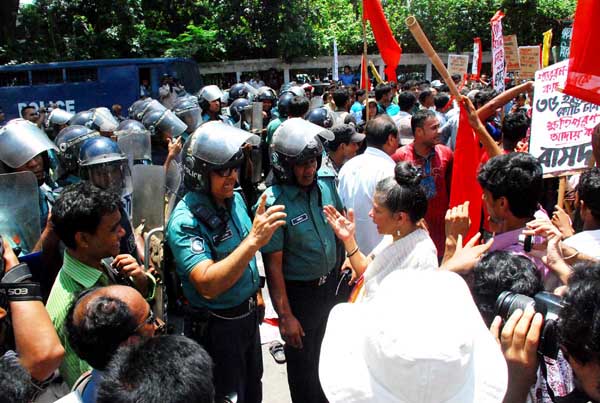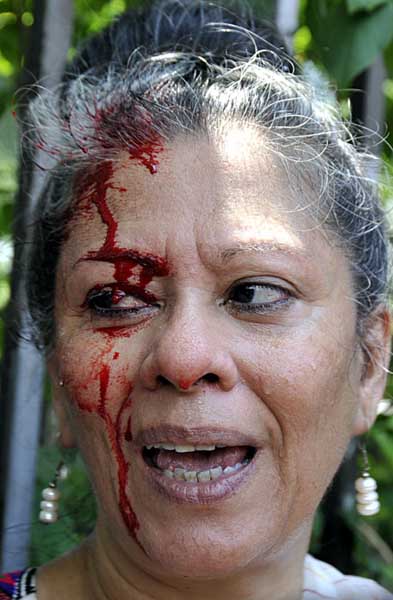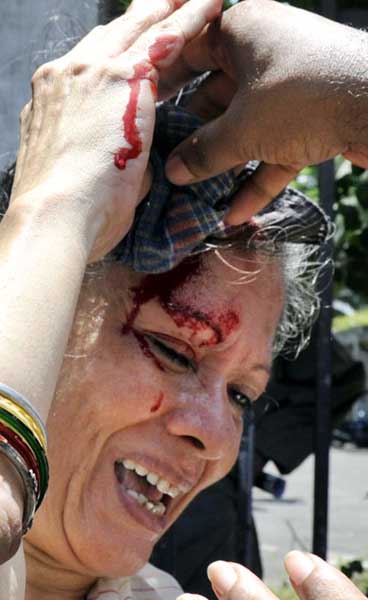What were doing this lady (so called girl friend of Anu Mahmud) on the rally? So called "National Committee to Protect Oil, Gas, Mineral Resources,Power and Ports" are working as agent of foreign country. They never want development of Bangladesh. We need gas, we need coal. Our democratic government has the right to take any decision for the interest of peoples of Bangladesh.
To:
From: bdmailer@gmail.com
Date: Thu, 16 Jun 2011 11:42:36 +0600
Subject: [ALOCHONA] Rahnuma Ahmed Injured
Rahnuma Ahmed Injured Rahnuma Ahmed was amongst around twenty people who were injured as police clashed with protesters at a rally held near the National Press Club in Dhaka.
Members of the National Committee to Protect Oil, Gas, Mineral Resources, Power and Ports were protesting against the government bid to give lease of two deep-sea blocks to US oil company ConocoPhillips South Asia New Venture Ltd for oil-gas exploration in the Bay of Bengal, which they say is against the interest of Bangladesh and is designed to profit a few corrupt individuals.
The police blockaded the rally near the secretariat, and baton charged the protesters as they approached the barricade. Writer and anthropologist Rahnuma Ahmed was one of several protesters who were injured during the clashes. The government plans to sign a contract with Connoco Phillips on the 16th June 2011.

Rahnuma Ahmed (centre) challenging police blockade near National Press Club Dhaka. 14th June 2011. Photo Hasan Raja

Rahnuma Ahmed was injured during the clash. 14th June 2011. Photo Hasan Raja

A `death squad' was the BNP-Jamaat government's gift to the nation, a gift that has been nurtured and defended by two successive governments, each claiming to be vastly different to the previous one.
Claiming not only to be better, but morally superior.
The death-knell was struck more than seven years ago, on June 2, 2003, when the cabinet committee on Law and Order decided to form the Rapid Action Battalion (RAB). Those present were the committee president Abdul Mannan Bhuiyan, law minister Moudud Ahmed, home minister Altaf Hossain Chowdhury, education minister Omar Farooq, and state minister for home affairs Lutfuzzaman Babar.
RAB was formally created eight months later, in March 2004, a composite force comprising elite members from the army, navy, air force, the police, and members of other law enforcement groups. It began full operations in June, the same year.
Remember Fakhruddin Ahmed, the ex-World Bank guy who led the military-installed caretaker government (2007-2008), who claimed to be driven by the objective of "holding a free, fair and credible election" which will truly reflect the "will of the people"? Who saw himself as a "champion or leader" motivated by the aim of "strengthening Bangladesh's democratic order"? (Time, March 22, 2007).
Well, if you search the records, it turns out that around 315 persons were killed extra-judicially under his, and general Moeen U Ahmed's, 23-month long emergency rule. Of these, the deaths of more than 250 persons were allegedly crossfire killings (`Bangladesh 2008. Insidious militarisation and illegal emergency,' Asian Human Rights Commission, December 2008).
Even if, for arguments sake, these persons were hardened criminals, how is the democratic functioning of state institutions strengthened by officials of its elite anti-crime, anti-terror force behaving exactly as criminals do?
By killing point-blank. By making up stories later of crossfires, shootouts and encounters, which every Bangladeshi knows to be untrue. I'm sure even their kids know that. I would have died of shame if my father had worked for RAB. I agree that kids don't choose their parents, let alone their dad's occupation but thank heaven, for big — very big — mercies!
And before that, surely you remember Khaleda Zia's stunning electoral victory because of the BNP's No 1 campaign promise: to improve law-and-order in the country? This of course didn't materialise, which made what the Awami League said in its 2008 electoral manifesto pretty accurate: extra-judicial killings had become the norm, the rule of law had disappeared. For, at the end of the BNP-Jamaat government's rule, the country's elite anti-crime and anti-terrorism force had been implicated in the unlawful killing of at least 350 people in custody. Additionally, of allegedly torturing hundreds more.
These minor matters however did not deter Khaleda Zia's government from awarding Swadhinata Padak, the most-prestigious national award, to RAB on March 23, 2006 for their "outstanding performance in maintaining law and order." It did not deter her government from awarding police medals to 28 RAB officers the next year. All of these officers, according to AHRC, have allegedly been involved in serious human rights violations, including extra-judicial killing.
And if one were to tote up the figures since January 6, 2009 — since the Awami League-led grand alliance's assumption of office — apparently, close to 200 people have been killed in RAB operations.
The director general of RAB had acknowledged 577 deaths, a figure which was later upped, in March 2010, to 622. Since extra-judicial killings have not ceased, official figures would now presumably be higher. Human rights groups in Bangladesh, however think that the number of crossfire deaths since RAB's inception has crossed a thousand.
Recently, the New York-based Human Rights Watch called on the government to either take major steps towards making RAB accountable, to reform it within the next six months, or to disband it altogether (Crossfire, HRW, May 10, 2011). When Nurul Kabir was asked to comment on HRW's urgent plea on a live TV talk show, he replied, our human rights organisations too would demand the same thing if they could.
How is democracy strengthened by giving killers legal impunity? For, as lawyers, journalists and human rights activists repeatedly point out, RAB enjoys impunity. A state of affairs enabled by the Armed Police Battalions ordinance, 1979, its 2003 amendment (on the basis of which RAB was formed), and the much older, colonial-era Code of Criminal Procedure, 1898.
RAB enjoys impunity because of governmental secrecy. Rules regulating RAB's conduct in its performance of law enforcement tasks were drafted and put into effect in 2005, but these rules have never been made public. Additionally, the 1979 ordinance and the 2003 amendment created special internal courts similar to a military court martial to put alleged offendors on trial. But till date, RAB officers have only been tried and punished for involvement in extortion, fraud, drug peddling, hiring sex workers. Not for committing grave human rights abuses. Not for torture. Not for killing.
The worst punishment meted out to RAB officers, even where allegations of extrajudicial killings — not through crossfire/shootout — have been confirmed in inquiry reports, has been, at most dishonorable discharge. No one has been criminally punished.
The government has not taken any action despite a High Court notice to the government asking why crossfire killings should not be declared illegal, the result of a public litigation filed by ASK, BLAST and Karmajibi Nari (June 29, 2009). Despite a suo moto ruling by the High Court asking the director general of RAB, and secretary, home ministry, to show cause why appropriate action should not be taken against RAB officers who, allegedly, had killed the Khalashi brothers.
The reconstitution of High Court benches, and re-assigning the 2 judges who had issued the suo moto ruling to civil instead of criminal cases, took care of that.
In the early days, people had celebrated when hardened criminals were crossfired by RAB. They had cheered, had distributed sweets, an occurrence which was used to justify RAB's modus operandi.
As each ruling government draws on RAB to carry out its vendetta against its political opponents, as each member of the public slumps and falls to the ground, as rumours fly around of individual officers, of small teams, hiring out their services to the monied to help them settle scores with their enemies, i.e., eliminate, what Brad Adams said at of HRW's press conference in Dhaka (May 10, 2011) does not seem far-fetched at all. A death squad is roaming the streets of Bangladesh.
I cannot help but wonder, how do higher-ups of the BNP-Jamaat government feel, what do they think when they see their successors pronouncements fizzle out? When the government's `zero tolerance' for crossfire killings, torture, deaths in custody (Dipu Moni, foreign minister) gradually rises? To its current status of `a hundred percent,' as evidenced by the prime minister's defence adviser, Maj Gen (retd) Tarique Ahmed Siddique's recent statement that Limon — the 16 year-old college student of Jhalokathi who was allegedly fired at point blank by RAB officials — is a `criminal'. That his father too, is a `criminal'. When the home minister Sahara Khatun chimes in, what Siddique said is the government's position. And, no, criminalising Limon a priori, while police investigations are being conducted, will not affect its findings. No, it will not influence judicial proceedings either.
Do they feel happy? Gleeful? Ha-ha, now that you are in the seat, now you know. See, there was no reason for being so outraged in April 2006 when the prime minister's advisor for parliamentary affairs, Salahuddin Quader Chowdhury mockingly warned opposition members: follow the "right path" (siratul mustakim) or else, you'll be on RAB's "crossfire" list.
Probably not. Perverse delight at the AL government's about-turn is probably tempered by news of Shaka Chowdhury's current distress. He was detained by RAB officers, and officials of Directorate General of Forces Intelligence (DGFI) last December. Initially charged with instigating a firebomb attack, Chowdhury, who is generally thought to be a war criminal, is presently being investigated for 1971 war crimes. In a letter from prison, addressed apparently to the British government, Chowdhury writes of losing consciousness while being beaten around the head and back. Of recovering consciousness only to discover himself strapped to a metal table. "My abductors were engaged in clamping on metal clips and clamps on various parts of my body – my toes, my knees, my genitals, my hernia incisions, my chest nipples and my armpits. A bearded doctor strapped a blood pressure measuring [device] on to my arm and started instructions to first insert needles under my toenails and switch on electric surges." (Guardian, February 25, 2011).
But, as Tasneem Khalil, journalist, who was himself handcuffed, blindfolded and tortured during the caretaker government period, insists, "In a civilized society, you cannot go after anyone in a totally arbitrary manner without access to bail and imprison them and not let them — [not let] their cases [be] tried by a free court, [an] independent court." Even barrister Moudud Ahmed, despite his "role in creating the battalion" should not have been been led away blindfolded from his home, as he was in early 2007. He should not have been interrogated round the clock. He should not have been held in custody without trial or access to lawyers. Even Moudud Ahmed has the "right to due process." (NPR, March 20, 2008). So would Lutfuzzaman Babar, currently imprisoned, who had said, "criminals do not have human rights."
Calls for disbanding RAB have, predictably enough, given rise to clutching RAB-ever more dearly to-the-bosom responses from the government. Earlier defenses, "RAB had only killed `criminals.' No more crossfire incidents are taking place in the country (law minister Shafique Ahmed), `What will the law enforcers do, save themselves or die, when criminals open fire on them?' (Sahara Khatun), `Crossfire killings are not human rights violations, they have helped bring extortion and other crimes under control' (port and shipping minister Shahjahan Khan), have been reinforced with new ones. A `conspiracy' is being hatched to disband RAB. A plot is afoot. Why? Because it has been successful in tackling violent crimes, in dealing with militancy, says our `one hundred percent sure' man, the prime minister's defence adviser. A few bad apples, the whole unit shouldn't be blamed. The conspirators are many, organisations, persons, foreign NGOs.
A deathly gift, treasured by the nation's rulers, whether civilian or military, whether the BNP-Jamaat and its smaller partners, or the Awami Leage and its alliance members. Treasured by each party when in power, despite having suffered. At times, viciously. Torture. Targeted killings.
Since violence begets more violence, for us, law-abiding members of the public, cross-firing RAB cannot be the answer. Neither can appealing to the British government provide any solution, mired as it is in imperial wars.
Only accountability, can. Only the due process of law, can. Only people's resistance, can.
This version is slightly changed, the original has been published in New Age, Monday, June 6, 2011
http://newagebd.com/newspaper1/editorial/21325.html




